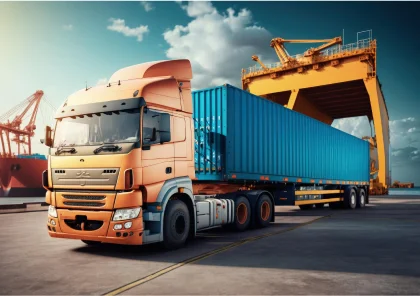
Land Freight transportation
Maritime transportation is pivotal for global trade, providing essential services that underpin international commerce. This mode of transport, which involves the movement of goods via ships across oceans, seas, and inland waterways, offers numerous advantages that make it the preferred choice for many industries. Here’s why maritime transportation is so crucial for shipments:
1. Cost-Effectiveness
One of the primary reasons maritime transportation is favored is its cost-effectiveness. Shipping by sea typically offers lower per-ton costs compared to other modes of transport like air or rail. This is due to the large cargo capacities of modern vessels, which allow for economies of scale. For bulk commodities and large quantities of goods, maritime transport provides a cost-efficient solution that significantly reduces overall shipping expenses.
2. Capacity and Scalability
Maritime transportation can handle enormous quantities of goods, from large bulk commodities like oil, coal, and grain to massive volumes of containerized cargo. Modern container ships, known as Ultra Large Container Ships (ULCS), can carry over 24,000 twenty-foot equivalent units (TEUs), making them capable of transporting vast amounts of cargo in a single voyage. This scalability is essential for meeting the demands of global supply chains.
3. Global Reach and Connectivity
Shipping routes span the globe, connecting virtually every port and region. This extensive network facilitates international trade by linking producers and consumers across continents. Major ports like Shanghai, Rotterdam, and Singapore serve as crucial hubs, enabling the smooth flow of goods between different parts of the world. The global reach of maritime transportation ensures that products can be efficiently transported from one corner of the globe to another.
4. Flexibility and Versatility
Maritime transport is incredibly versatile, accommodating a wide range of cargo types. From containerized goods to liquid bulk, dry bulk, and specialized cargo like automobiles or machinery, shipping can handle diverse shipment needs. This flexibility allows businesses to choose the most appropriate vessel and shipping method for their specific cargo, enhancing operational efficiency.
5. Infrastructure and Technological Integration
The maritime industry benefits from advanced infrastructure and technology that enhance efficiency and safety. Ports are equipped with modern facilities, including large cranes, automated systems, and extensive storage capabilities. Additionally, advancements in navigation and communication technologies, such as GPS and Electronic Chart Display and Information Systems (ECDIS), improve route planning and tracking, ensuring timely and accurate delivery of shipments.
6. Environmental Considerations
While maritime transport does have environmental challenges, it is often considered more environmentally efficient compared to other modes of transport for long-distance shipping. Efforts are ongoing to further reduce the environmental impact of shipping through cleaner fuels, improved vessel designs, and regulatory measures. The industry’s shift towards sustainable practices aims to balance the benefits of maritime transport with environmental stewardship.
7. Safety and Security
Shipping is one of the safest modes of transport for large volumes of goods. The maritime industry adheres to stringent safety standards and international regulations to ensure the security of cargo and vessels. Maritime organizations, such as the International Maritime Organization (IMO), establish guidelines and protocols to manage risks and enhance safety across the global shipping network.
8. Economic Impact
The maritime industry is a major driver of economic activity. It supports a vast network of businesses, including shipping lines, port operators, logistics providers, and freight forwarders. This sector contributes significantly to employment and economic growth in regions with major ports and shipping activities. Additionally, the cost savings associated with maritime transport benefit consumers by keeping prices lower.




